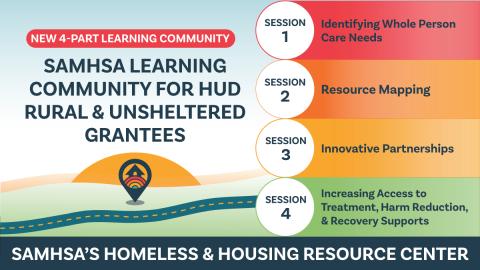Knowledge & Resources
Search and download a library of information and resources for health professionals and housing specialists.
Featured Article

This Learning Community for HUD Rural and Unsheltered grantees will focus on supporting Continuums of Care (CoCs) in understanding and building cross-system partnerships that address the needs of individuals and families impacted by substance use and/or mental disorders among those experiencing unsheltered homelessness and homelessness in rural areas.
Read MoreExplore The Resources
Filter
Clear AllResults
Fact Sheet Boosting the Power of Harm Reduction
This resource outlines strategies to build a coordinated and culturally responsive system of care for people with substance use disorders who are experiencing homelessness.
-
Toolkit Whole-Person Care for People Experiencing Homelessness and Opioid Use Disorder: Toolkit Part 2
This guide focuses on understanding the neurobiology of opioid use disorder (OUD) and the treatment and recovery pathways for OUD. The guide covers best practices for referrals and warm handoffs, as well as assistance in meeting basic needs such as income, food, and mainstream benefits.
Article Learning Community: Trauma-Informed Outreach and Engagement
In this four-part series, attendees will learn the fundamentals of providing Trauma-Informed Care (TIC) from the lens of working to engage and provide services for people with behavioral health needs who are also experiencing homelessness.
-
Toolkit Effective Property Management Engagement Strategies
This issue brief covers identifying service providers’ strengths and resources that will appeal to property management, developing an agency “pitch," identifying existing rental industry networks or initiating a network where none exists, and formalizing the property management-provider partnership.
-
Toolkit Applying New COVID-19-Related Funding to Address the Housing Needs of Individuals with Serious Mental Illness, Substance Use Disorders, and Co-occurring Disorders
This paper highlights newly available federal funds that can be utilized for housing and paired with supportive services funding for individuals who are experiencing or at risk of homelessness and who have a serious mental illness, a substance use disorder, or co-occurring disorders. The paper also notes several ways for state and local leaders to promote cross-system partnerships that pair...